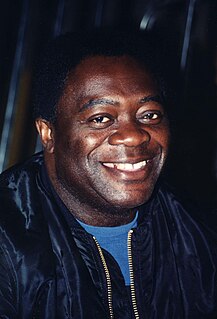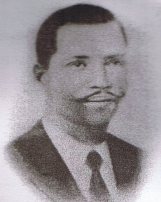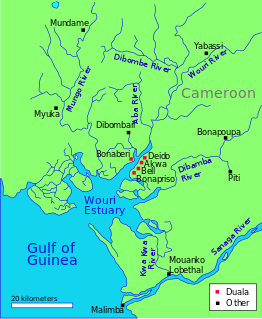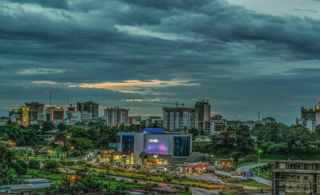Duala is a dialect cluster spoken by the Duala and Mungo peoples of Cameroon. Douala belongs to the Bantu language family, in a subgroup called Sawabantu. Maho (2009) treats Douala as a cluster of five languages: Douala proper, Bodiman, Oli, Pongo and Mongo. He also notes a Douala-based pidgin named Jo.

Yaphet Frederick Kotto is an American actor known for numerous film roles, as well as starring in the NBC television series Homicide: Life on the Street (1993–99) as Lieutenant Al Giardello. His films include the science-fiction/horror film Alien (1979), and the Arnold Schwarzenegger science-fiction/action film The Running Man (1987). He portrayed the main villain Dr. Kananga/Mr. Big in the James Bond movie Live and Let Die (1973). He appeared opposite Robert De Niro in the comedy thriller Midnight Run (1988) as FBI agent Alonzo Mosely.
The Mungo (Moungo) are an ethnic group of the Republic of Cameroon. Along with the other coastal peoples, they belong to the Sawa ethnic groups. The Mungo have historically been dominated by the Duala people, and the two groups share similar cultures, histories, and claims of origin.
A jengu is a water spirit in the traditional beliefs of the Sawa ethnic groups of Cameroon, particularly the Duala, Bakweri, and related Sawa peoples. Among the Bakweri, the name is liengu. Miengu are similar to Mami Wata spirits.
Ewale a Mbedi was the eponymous ancestor of the Duala people of Cameroon. According to the oral histories of the Duala and related Sawa peoples of the Cameroon coast, Ewale hailed from a place called Piti. He and his followers migrated southwest to the coast and settled at the present-day location of Douala. The area was inhabited by the Bassa and/or Bakoko, who were driven inland by the new arrivals. Meanwhile, Ewale and his followers set up trade with European merchant ships.
Mbedi a Mbongo is the common ancestor of many of the Sawa coastal ethnic groups of Cameroon according to their oral traditions. Stories say that he lived at a place called Piti, northeast of present-day Douala. From there, his sons migrated south toward the coast in what are known as the Mbedine events. These movements may be mythical in many cases, but anthropologists and historians accept the plausibility of a migration of some Sawa ancestors to the coast during the 16th century.

Monneba, also spelled Moneba and other ways, was a local Duala leader on the Cameroon coast in the 1630s. Dutch sources from the 1660s say that Monneba ran a trading post on the Cameroons River at the present location of Douala. His people dealt primarily in ivory, with some slaves. Modern scholars equate Monneba with a Duala ruler named Mulobe a Ewale or Mulabe a Ewale. Assuming this is true, he is the earliest Duala leader of whom we have corroboration in written sources. It is quite possible that Monneba/Mulobe was the ruler who set into motion the transformation of the Duala into a trading people and the most influential ethnic group in early Cameroonian history.
George or Joss, born Doo a Makongo or Doo a Mukonga, was a king of the Duala people in the late 18th century. Doo a Makongo was the son of Makongo a Njo. He lived at Douala on the Wouri estuary on the coast of Cameroon. By 1788–1790, Doo was a powerful ruler in the area. During this time, the British slave trade was at its height, and Douala was the primary trading post in the region.
Kwane a Ngie, known in British records as Angua or Quan, was a Duala ruler from the Bonambela sublineage who flourished from 1788 to 1790 in Douala, Cameroon. The British slave trade was at its height at this time, and, although a rival ruler from the Bonanjo sublineage named George or Joss reigned simultaneously, British records point to Kwane as the more powerful or respected leader.

Rudolf Duala Manga Bell was a Duala king and resistance leader in the German colony of Kamerun (Cameroon). After being educated in both Kamerun and Europe, he succeeded his father Manga Ndumbe Bell on 2 September 1908, styling himself after European rulers, and generally supporting the colonial German authorities. He was quite wealthy and educated, although his father left him a substantial debt.
Auguste Manga Ndumbe Bell was a leader of the Duala people of southern Cameroon from 1897 to 1908 during the period after the German colonialists assumed control of the region as the Kamerun colony.

Ndumbé Lobé Bell or King Bell was a leader of the Duala people in Southern Cameroon during the period when the Germans established their colony of Kamerun. He was an astute politician and a highly successful businessman.

The Dibamba River is in the Littoral Region of southern Cameroon, emptying into the Cameroon estuary near the city of Doula.

The Wouri estuary, or Cameroon estuary is a large tidal estuary in Cameroon where several rivers come together, emptying into the Bight of Biafra. Douala, the largest city in Cameroon, is at the mouth of the Wouri River where it enters the estuary. The estuary contains extensive mangrove forests, which are being damaged by pollution and population pressures.
Pongo is a dialect of the Duala language, spoken on the coast of Cameroon, in the district of Dibombari, by the Pongo tribe. It belongs to the Bantu languages, Code A26 according to Guthrie classification.
Alexandre Douala Manga Bell was head of the Duala people in Cameroon, German officer and French politician.






